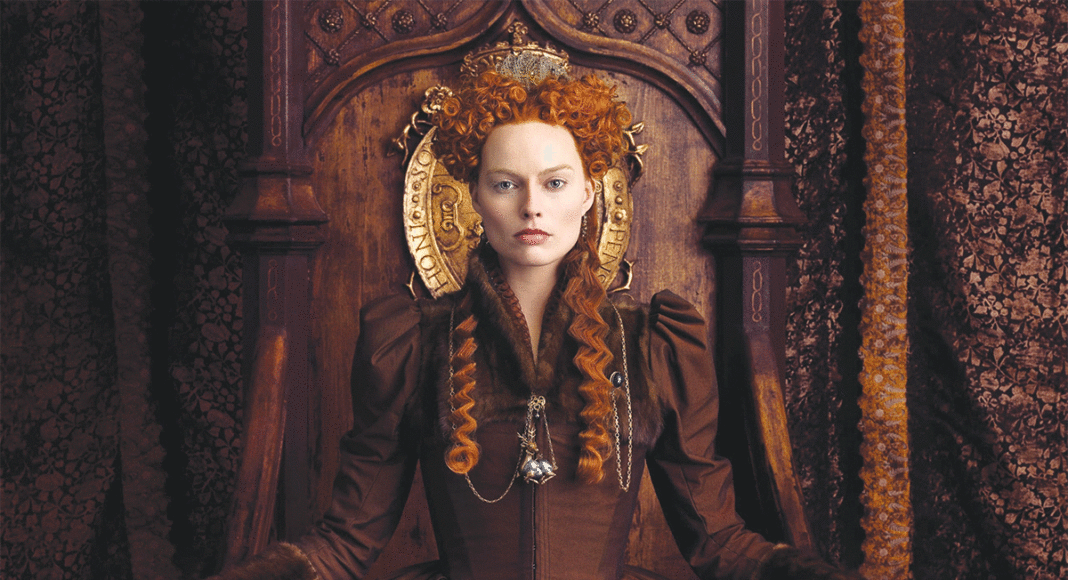In Tudor England, it’s just one damn thing after another. Widowed by a weakling French King, the new Queen of Scotland (Saoirse Ronan) arrives in 1561 on a glum coast.
Flash forward to her fate at the chopping block at Fotheringhay Castle. Guards rip off her outer gown, revealing the red dress of a Catholic martyr. Gasps all around either at the effrontery or at the chic fashion choice. But Mary Queen of Scots is about the lead up to this death, in her clashes with her ruthless frenemy (and cousin) Queen Elizabeth, played by Margot Robbie.
The Scots Queen has a rocky time in her batcave of a castle. She’s thundered against by the Protestants. Their spokesman: the preacher who put the Knox in obnoxious, John Knox. David Tennant plays the angry divine as a walking hairball in a velvet cap; he’s so obscured by whiskers that he’s excused for bugging his eyes trying to get his fans to recognize him. Mary faces wrath among the Scottish lairds, paid with English gold to destabilize the land.
But the Queen of Scots just wants a court of peace where everyone can have access to her multi-pierced ear. She’s religiously tolerant and LGBT friendly: her favorite person is a gay lad-in-waiting, played by Ismael Cruz Cordova, who likes to dress up as one of the ladies. Her castle is a much nicer place than Elizabeth’s palace, where the earls and knights all stand around muttering into their ruffs, wondering when Her Majesty is going to get married and start producing a few heirs.
Director Josie Rourke debuts after a background in theater. She’s a sort of calmer version of Julie Taymor. Here are processionals, actors standing and delivering their lines, and a fascination with draperies and costume. As in most modern Shakespeare, Rourke uses color-blind casting of black and Asian actors, which will hopefully nauseate British National Party members. Exteriors are lots of cattle and a little battle, with theatrical euphemism. There is no arterial spray in the skirmishes staged like football scrimmages; the entirety is far less violent than versions of this story I’d seen decades ago.
Ronan is ravishingly pretty and sympathetic, and she gets a kissing scene on horseback. “You dare touch a sovereign without her permission!” she says, which is sort of immemorial movie stuff. Given Robbie’s devotion to outre makeup and staring—as seen in the ice skating scenes in I, Tonya—it’s too bad she didn’t get to go eyeball to eyeball with John Knox. She has a prosthetic hook to her nose, and after a bout with the pox, she sports thick white makeup and a fluorescent red-orange wig that makes her resemble Stephen King’s It.
Each queen has a credible argument that the other was a usurper, but Mary Queen of Scots suggest that they would have had easier lives if they’d shown true sisterhood to one another. Elizabeth complains that “the throne has made me a man,” as if it’s a bad thing. This, as opposed to that famous moment where the English queen told her court proudly she had “the heart and stomach of a king.”
“I am not my father,” Elizabeth says, stung, when Mary predicts that being in Elizabeth’s care will end with her being executed; one previously thought that Elizabeth was proud of having a feared tyrant of a father, and that his reputation steadied her shaky throne.
Mary Queen of Scots breaks its template of modern enlightenment at the end. Exiled and at her weakest, Mary decides to pull rank on her rival Queen, a display of the kind of bravery that is usually called “gall.” However, the explanation of what happened between imprisonment and execution is missing.
In college, they warn you against the kind of history where things had to happen because they happened the way they happened. Thus we miss the question of what kind of plotting Mary had been up to—real or imaginary.
Mary Queen of Scots is an improvement over the pointless catfighting in The Favourite, but it misses a conclusion more solid than the idea that menfolk cause all the trouble in the world—that they’re weaklings and schemers keeping the sisters from doing it for themselves.
MARY QUEEN OF SCOTS
Directed by Josie Rourke. Written by Beau Willimon. Starring Saoirse Ronan, Margot Robbie, David Tennant, and Guy Pearce. (R) 124 minutes.












